This July, the COBA classroom moved around the world to Leipzig, Germany with professors Don Pope and Dennis Marquardt leading the way. Students received course credit in Cross Cultural Organizational Behavior and Global Operations Management. We asked Dr. Pope to tell us an overview of their trip. We hope you enjoy the second installment of our four part blog series on the 2018 travels of the COBA Study Abroad program.
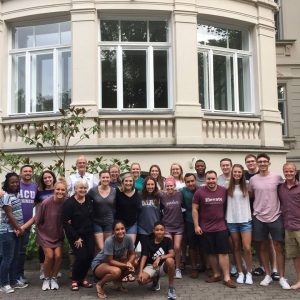
The group poses in front of their home away from home in Leipzig
What made Leipzig a unique place to study?
Leipzig is a mid-sized German city with a long and proud history. It is not a tourist destination. You would have to search for a souvenir shop. It is historically important because it was the home of Bach, among other well known German musicians and writers. Martin Luther lived in the nearby town of Wittenberg. Leipzig was the center of the ‘quiet revolution’ uprising that brought down the iron curtain in 1989. The German language adds a dimension to a study abroad experience that an English-speaking location cannot provide. But, enough English is spoken to allow one to get around without great difficulty.
Were you able to visit any companies or work on projects with companies in other countries?
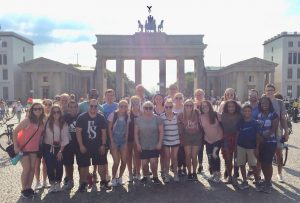
At the Brandenburg Gate in Berlin
We toured the BMW assembly plant in Leipzig which is very modern, is automated, and operated with great German efficiency and attention to sustainability.
Did you take the students on any sight seeing tours?
We took the students to visit Wittenberg where Martin Luther nailed his statement of protest to the church door 501 years ago, at great personal risk to his life. We also did a group tour of Berlin and many of the sites there, including the Berlin wall and memorial museum for Jews who lost their lives in the Holocaust. We traveled to Weimar and the nearby site of the World War II Nazi concentration camp, Buchenwald. We saw a place of great horrors and felt the weight of the suffering that occurred there. We saw the 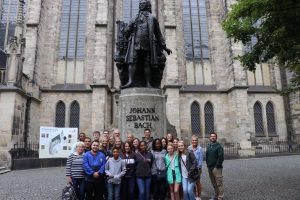 ovens that burned the bodies of those killed, the hooks on the walls where people were hung, the shoes of the victims, many of them children. We saw the memorial to the living – those who survived. The memorial plaque is simple in design, and heated to a living temperature of 98.6 all through the cold winters.
ovens that burned the bodies of those killed, the hooks on the walls where people were hung, the shoes of the victims, many of them children. We saw the memorial to the living – those who survived. The memorial plaque is simple in design, and heated to a living temperature of 98.6 all through the cold winters.
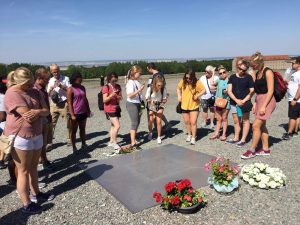
Visiting the Buchenwald Concentration Camp Memorial
What is it like to be able to spend so much time with students in another country? How does it differ than being in a classroom setting in Abilene?
Spending time in other countries helps to open your mind, eyes and heart to the world and appreciate the lesson that God tried to each Jonah long ago – that He loves and cares for all people everywhere.
What were your favorite moments/experiences of the trip? 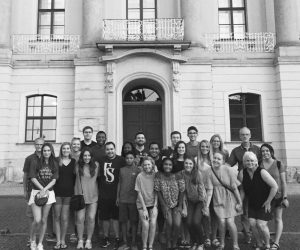
The trips mentioned above, and getting to hang out with the students and get to know them better.
If students could only learn one thing, what do you hope they learned?
That the world is a much bigger place than the little bubble that most of us live in, and that we need to learn to live and function in a global community.